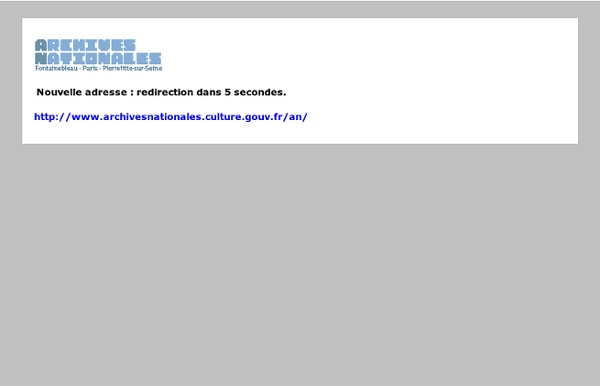



Des documentaires pour l'histoire des arts Voici une sélection de livres documentaires pour l’histoire des arts, essentiellement les arts plastiques : Pour les profs Pour réfléchir autour de l’art Histoire de l’art Collections jeunesse sur l’art Iconographie (thèmes, disciplines) Orientation (métiers de l’art) Voir aussi la bibliographie Art et Littérature Et les sites proposés sur la Toile du CDI Barbe-Gall, Françoise. Site : Public : adultes Objectifs : aider les adultes à parler d’art aux enfants, de 5 à 13 ans. Prix : 16 euros Quelques titres : Comment parler des arts premiers aux enfants ? Comment parler d’art contemporain aux enfants ? Comment parler du Louvre aux enfants ? Comment parler du Centre Pompidou aux enfants ? Larousse / Collection Comprendre et reconnaître Site : Tout Public Objectif : Guide pratique pour permettre à un lecteur non spécialiste d’aborder les caractéristiques principales d’un art. Prix : 27 euros Prix : 35 euros
Archives départementales de Tarn-et-Garonne guide genea Naturalisation : définition La naturalisation accorde à un étranger la nationalité française. Elle ne concerne pas seulement la période contemporaine mais aussi l'Ancien Régime. La naturalisation comme la nationalité a évolué au cours des siècles. Sous l'Ancien Régime, le roi accorde des lettres de naturalité. Après la Révolution, la notion de citoyen apparaît et évolue au cours du temps. Sources pour les naturalisations Les documents Ancien Régime : les lettres de naturalité peuvent être trouvées aux archives départementales (série B notamment les fonds des cours des comptes et des parlements) et aux archives nationales. A partir de 1789, les demandes de naturalisations (ayant abouti ou non) concernant toute la France sont conservées dans la série judiciaire : Attention, le délai de communication des naturalisations est de 60 ans. Aux archives départementales, les demandes faites à partir d'un département sont conservées dans la série M. Comment procéder pour la recherche Bibliographie
OCAIW: Orazio Centaro's Art Images on the Web Etat civil 1802-1902 - Archives départementales du Lot Accueil > Votre compte personnel Nous avons souhaité savoir quels étaient les internautes venant consulter nos images numérisées. C'est pourquoi nous vous demandons de remplir le formulaire d'inscription ci-dessous. L'inscription est gratuite, bien entendu, et vous pourrez vous désinscrire à tout moment. Après avoir rempli et validé ce formulaire, vous recevrez un e-mail de confirmation qui vous rappellera l'identifiant et le mot de passe à utiliser à chaque nouvelle session. Le Département du Lot vous autorise à réutiliser librement les informations contenues sur ce site, à condition que vous vous engagiez expressément à : Ne pas faire un usage commercial des données (ne pas les vendre) NB : Usage commercial : usage en vue de l’élaboration d’un produit ou d’un service destiné à être mis à disposition d’un tiers à titre onéreux. A ces conditions, toute personne est libre d’utiliser les informations et données mises en ligne sans avoir à contacter les Archives départementales du Lot.
OCAIW - CRANACH DIGITAL ARCHIVE Grand Palais - RMN (Officiel) Affichage article Histoiredesarts.culture.fr www.histoiredesarts.culture.fr Histoiredesarts.culture.fr donne accès à plus de 350 sites producteurs de ressources culturelles (musées, théâtres, services des archives, réseaux du livre et de la lecture, associations de valorisation du patrimoine, orchestres, etc.). Histoiredesarts.culture.fr, c'est un moteur de recherche adapté aux enseignants : la recherche peut s’effectuer par période historique, par domaine artistique et par thématique selon les critères de l'organisation de l'enseignement de l'histoire des arts. Les fonctionnalités simples et pratiques offrent notamment : Une recherche par carte interactive, par organisme et par ville ; Des repères chronologiques permettant de situer des œuvres et des artistes dans le temps et au sein des différents courants artistique ; Un « focus » mensuel sur un événement artistique, un parcours thématique ou une innovation numérique ; Une lettre d'information avec une rubrique « L'histoire des arts sur le terrain ».
Histoire des arts - Ressources - PUBLIQUES La liste d'œuvres proposée ici est conçue pour faciliter le travail des professeurs. Elle prend en compte la «liste de référence» du programme de l'école primaire BO hors série n°3 du 19 juin 2008, les périodes historiques définies par ce programme, les six grands domaines artistiques désignés en page 3 de l'encart du BO n°32 du 28 août 2008. Les professeurs peuvent la compléter en fonction des ressources artistiques et culturelles locales : musées, patrimoine architectural, écoles d'art, de musique, de danse, de théâtre, etc. Exemples d'œuvres pour le cycle 3 Ces pistes sont données à titre indicatif. Pistes pour la mise en œuvre